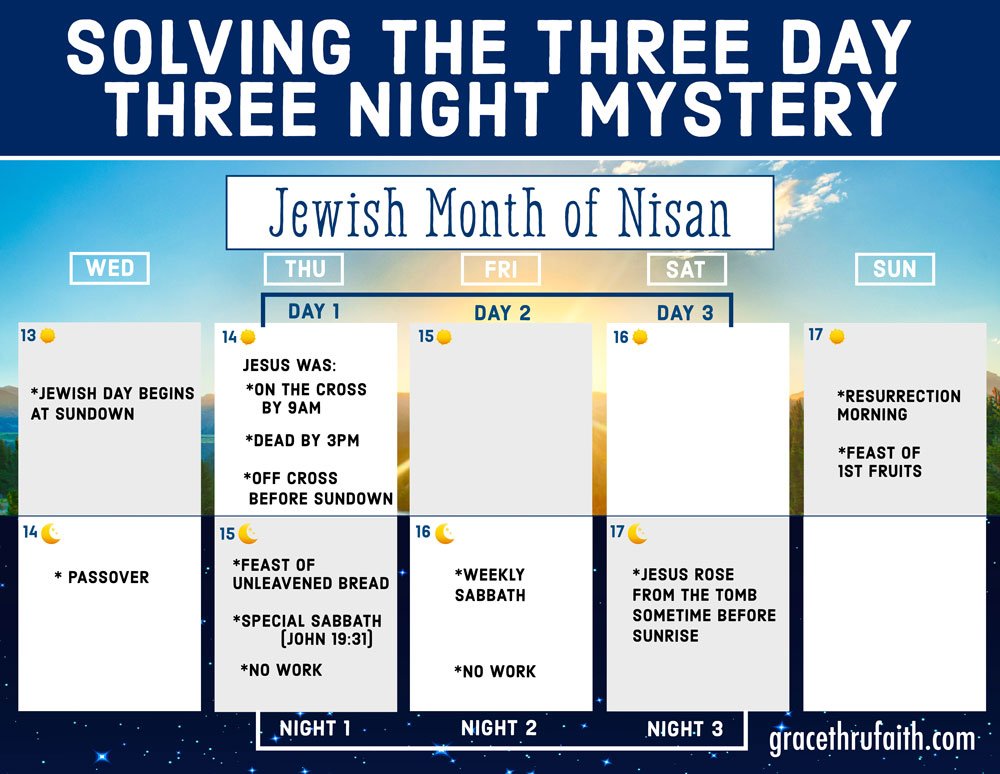If Matthew 12:40 literally means three days and three nights then the crucifixion cannot be on Friday. Some say rather than a literal three days it is an old idiom referring to the two days prior to the day being spoken of. We have found nothing to substantiate this view. The Friday crucifixion is the most widely held view due to the traditional celebration of Easter. Did the crucifixion actually take place on Wednesday, Thursday or Friday?For as Jonah was three days and three nights in the whale's belly; so shall the Son of man be three days and three nights in the heart of the earth. (Matthew 12:40)
In order to make the most informed estimate, we need to examine the Sabbath. The original Hebrew word "Shabbath" is defined as: an intermission, the day of rest, the holy seventh day; a week (Leviticus 23:15 [cf. Deuteronomy 16:9; Matthew 28:1]), the sacred seventh year, a sabbatical year.
Leviticus 23:1-4 lets us know about the "weekly sabbath," that day set aside each week to honor the Lord. Verse three defines how a sabbath is to be observed, i.e., "...but the seventh day is the sabbath of rest, an holy convocation: you shall do no servile work therein: it is the sabbath of the Lord in all your dwellings."
However, these are NOT the only sabbaths. Besides the weekly sabbaths there are the High Sabbaths related to the Hebrew Feasts (or Festivals), described in Leviticus 23:4-44.
For example, the verses above speak of two feasts, Passover and Unleavened Bread. Passover starts on the 14th day of Nisan (Hebrew month) and lasts one day. The Feast of Unleavened Bread starts the next day (i.e., the 15th of Nisan) and lasts for seven days.These are the feasts of the LORD, even holy convocations, which ye shall proclaim in their seasons. In the fourteenth day of the first month at even is the LORD'S passover. And on the fifteenth day of the same month is the feast of unleavened bread unto the LORD: seven days ye must eat unleavened bread. In the first day ye shall have an holy convocation: ye shall do no servile work therein. But ye shall offer an offering made by fire unto the LORD seven days: in the seventh day is an holy convocation: ye shall do no servile work. (Leviticus 23:4-8)
Please note, the Passover is not a High Sabbath day, this important fact is often overlooked. You can tell because the usual command for a sabbath of "an holy convocation and no servile work is to be done," is not given for Passover. So while Passover is a feast day, it is not a sabbath day. "Why is that important?" you ask. It was on this day Jesus did the work of redemption. Servile work would have been unlawful on a Sabbath day, so God ordained for this day to be a festival, remembering the lamb's blood that caused the angel to "Passover" the Israelites in Egypt and pointing to the Lamb who would shed His blood for all mankind.
One other important feast day is not a High Sabbath day, the Feast of First Fruits. Interestingly enough, this is the day of Jesus' resurrection.
The Lord set forth two sabbath days each for the Feast of Unleavened Bread and the Feast of Tabernacles. Leviticus 23:7-8 tells us that both the first and seventh (last) day of the Feast of Unleavened Bread is an holy convocation and to do no servile work therein. Leviticus 23:35-36 states the same for the Feast of Tabernacles. As you go through the remaining feasts you will see the same instruction.
Next we need to examine what Jesus said regarding His death.
(Just a side note: for those who say the story of Jonah is untrue and just a legend—it appears that Jesus doesn't agree with them!)For as Jonah was three days and three nights in the belly of the great fish, so will the Son of Man be three days and three nights in the heart of the earth. (Matthew 12:40 NKJV)
Jesus said three days and three nights. There is absolutely no way to get three days and three nights from Friday to Sunday. The chart below shows this, remember a Jewish day starts at sunset rather than midnight.
Assuming Jesus rose from the dead AFTER sunrise on Sunday, which is not stated as such in the Scriptures (the Scriptures merely state that Mary Magdalene went to the tomb right after sunrise), there still are only two nights. There is no way to get three nights in this scenario. To dogmatically choose this position of crucifixion on Friday and Resurrection on Sunday is to choose a position contrary to Jesus' own prophecy.Day 1 = Friday before Sunset
Night 1 = Friday sunset - Saturday sunrise
Day 2 = Saturday sunrise - Saturday sunset
Night 2 = Saturday sunset - Sunday sunrise
Day 3 = Sunday sunrise - resurrection
Another Scripture to consider is John 12:1, "Then Jesus six days before the passover came to Bethany...". Jesus was travelling from Jericho. If the crucifixion took place on Friday (which had to also be Passover), then this journey took place on the sabbath. Travelling that distance on the sabbath was legally out of the question for a devout Jew.
What if the crucifixion took place on Thursday? This would certainly add the additional night we need to fulfill Jesus' prophecy, but it raises a problem with the days because you have to count partial days for either the crucifixion or resurrection, but not for both. The partial days problem can be argued successfully but not conclusively because, as stated earlier, all we are told about the resurrection is that Jesus arose on the day after the weekly sabbath. This could be anytime from Saturday just after sunset to the point where Mary Magdalene saw Him, after sunrise.
Proponents of a Thursday crucifixion might argue counting a partial day for Thursday (the crucifixion), a day for Friday, a day for Saturday (day) and that Jesus arose just after sunset at the beginning of the fourth day which would not be counted. In addition, there would be three full nights in between as well. So Thursday can be argued from the Scriptures.
It is possible to argue for a Wednesday crucifixion if you don't count partial days (i.e. knowing that Jesus died at 3:00 p.m., you don't count the three hours of Wednesday as a full 12 hour day). The scenario would be as follows:
In this view, Jesus is resurrected sometime between sunset on Saturday and sunrise on Sunday, which would be a partial night and therefore not counted.Day 0 = Wednesday 3:00pm - sunset
Night 1 = Wednesday sunset - Thursday sunrise
Day 1 = Thursday sunrise - Thursday sunset
Night 2 = Thursday sunset - Friday sunrise
Day 2 = Friday sunrise - Friday sunset
Night 3 = Friday sunset - Saturday sunrise
Day 3 = Saturday sunrise - Saturday sunset
Now why did the early church decide it was Friday? Read the following verse:
They assumed since it was the day before the sabbath, it meant Friday. Here is where our background on the sabbath sheds some light. We know that since the crucifixion was on the Passover, it was automatically the day before a sabbath, no matter what day it was on, because the High Sabbath day of the Feast of Unleavened Bread was the next day. Again, no matter what day Passover was on, the next day was automatically a sabbath.Now when evening had come, because it was the Preparation Day, that is, the day before the Sabbath, Joseph of Arimathea, a prominent council member, who was himself waiting for the kingdom of God, coming and taking courage, went in to Pilate and asked for the body of Jesus. (Mark 15:42-43 NKJV)
Holding to a Friday crucifixion really is at odds with Scripture. Scripture does say that it was the Feast of First Fruits when He arose, so we know that the resurrection was Sunday (i.e., sunset Saturday — Sunday sunrise). Therefore, using Jesus' own words we conclude it was a Wednesday or Thursday crucifixion
If we factor in two more important points there is a stronger case for a Thursday crucifixion:
- When the Holy Spirit inspired the writing of the Bible (66 books, written by 40 authors over 2000 years), He wove various clues into the text in order for us to verify the authenticity of the Bible. As we see prophecy come to pass we gain more respect for the Word because only the God who knows the end from the beginning could predict with 100% accuracy. God's plan for redemption is the message of the Scriptures, it is the gospel, or "good news." There are proclamations or subtle clues on literally every page.
The Feasts were not only historic (i.e., to be celebrated once they left Egypt and settled into the Promised Land of Israel), but also prophetic, pointing to the Savior (read Hebrews 8:1-10:39). It is no coincidence that Jesus was crucified on Passover, the same day God saved the Hebrews from the death in Egypt by placing blood of a lamb on the door posts and door jambs (making a cross). It is no coincidence that Jesus arose from the dead on the feast of First Fruits. It is no coincidence that the Church was officially given the power of the Holy Spirit to proclaim the gospel on the Feast of Pentecost.
There are many other accounts in the Scripture that point specifically to Christ's redemption of mankind. Let's go back to Genesis and visit Noah. It is generally held that the ark is a "type" of Jesus. The ark saved Noah and his family from the wrath of God's judgment upon the evil world. Jesus offers salvation to all those who trust in Him, sparing them from judgment for their sins.
The ark rested, or finished the work of saving Noah's family on a significant day. - The last argument for a Thursday crucifixion comes from the actions of Mary Magdalene. Why did Mary wait until Sunday to go to the tomb with the ministering oils and herbs? If the crucifixion took place on Wednesday, then Thursday would have been the High Sabbath, making it impossible for her to go to the tomb on that day, but Friday would have been a normal day, with no restrictions. If on the other hand Thursday was the day of the crucifixion, then Friday would have been the high sabbath, and Saturday would have been the weekly sabbath (making it impossible for her to go on Friday or Saturday), leaving Sunday as the first "legal" day she could have made the trip.
What we do know is that it occurred on Passover as a model of the sacrifice of the perfect Lamb, and that He rose again on the Feast of First Fruits, since He is the First Fruit of the resurrection. It is fine to hold a personal view, but unwise to become dogmatic about it. We should celebrate the cross and the resurrection every day of our earthly visit.

The Three Days and the Three Nights - Study Resources
The Three Days and the Three Nights 'Did the crucifixion actually take place on Wednesday, Thursday or Friday?... We should celebrate the cross... every day'


